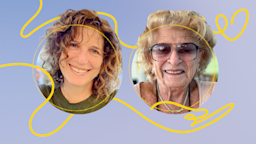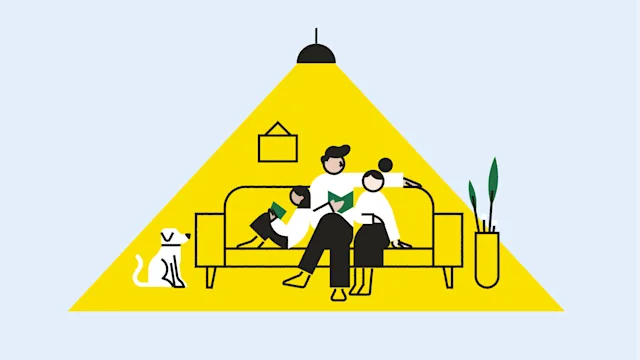Key takeaways:
Forgiving someone who has hurt you can be hard. If you want to forgive someone, it starts with recognizing your pain and expressing your hurt to the wrongdoer or a trusted friend.
When you forgive someone, it doesn’t mean you’re OK with the way they treated you. It’s more about letting go of anger and being hopeful for your future.
It’s OK not to forgive someone. It may be more helpful to focus on forgiving yourself and resolving any guilt or shame you may be carrying rather than forgiving the other person.
In his autobiography, “Long Walk to Freedom,” Nobel Peace Prize winner Nelson Mandela wrote: "As I walked out the door toward the gate that would lead to my freedom, I knew if I didn’t leave my bitterness and hatred behind, I’d still be in prison."
That, in essence, is the definition of forgiveness.
Forgiveness involves letting go of resentment and moving forward with hope. It doesn’t mean excusing harmful behavior. Rather, it means releasing anger and living in peace. But forgiveness isn’t always easy, especially when you’ve been traumatized or seriously harmed.
Forgiveness is also a personal choice. It can depend on your values and cultural beliefs. And it’s OK if you choose not to forgive someone. What’s more, you may find that it’s easier to forgive in stages or to forgive some things and not others. You may also change your mind over time. That’s OK too.
But if you do want to explore forgiving someone who hurt you, we’ve got some thoughts to get you started.
Steps toward forgiveness
It’s important to understand that forgiveness is a process. It can take months, years, or even a lifetime to forgive someone who has deeply wronged you. And you may decide forgiveness isn’t right for you. Whatever you choose, that’s OK.
As you consider the following steps, bear in mind that forgiveness doesn’t dismiss the wrongdoer’s behavior. It also doesn’t mean you have to maintain a relationship with them. It’s about experiencing freedom from ruminating thoughts and chronic anger.
1. Acknowledge your pain and hurt
It’s OK to feel hurt. Sometimes people say or do things that cause emotional pain. Take time to recognize how an offense has affected you. Consider how it has occupied time and energy in your mind.
2. Express your emotions
Tell someone how you’re feeling. This could be the person who upset you, a trusted friend, or a counselor. Talking about your emotions can help you process the pain. However, if it hurts too much to discuss openly, try writing or drawing about it. There’s no need to share your work with others unless doing so will support your healing.
Read more like this
Explore these related articles, suggested for readers like you.
3. Build empathy toward yourself
Being compassionate toward yourself plays a big part in your healing journey. It’s often an important part of working toward forgiveness because there’s a strong link between forgiveness and empathy.
You may want to build empathy for yourself by accepting:
Your emotional response to what happened
Not being able to forgive someone who hurt you
That you and others have imperfections
Try to look at your thoughts and feelings without judging them. Think about how you’d respond to a friend who’s going through a hard time. You’d probably be kind and supportive, not critical. Practice doing the same for yourself. Self-compassion can be a helpful tool to help you do this.
4. Understand the other person’s behavior
This is tough to do because it means looking at the wrongdoer in a different light. But it may help you work toward forgiveness to understand why someone might hurt others.
You can think about this using specific knowledge about the individual who hurt you. You can also think about it more generally, such as why people with a substance use disorder may sometimes act in ways that hurt others.
Here are some steps you can take to develop an understanding of why someone might hurt others:
Consider the offender’s personality.
Think less about the harm done and more about the person and what might motivate their behavior.
Assess the things that may have led to the behavior.
See their behavior through their eyes.
Keep in mind that trying to understand why someone might hurt others doesn’t excuse their behavior. But it may help you forgive, if that’s important to you.
5. Decide to forgive
See the person who hurt you as a human being who behaved badly. Even if you’re not able to restore the relationship, you can choose to forgive and release any thoughts of revenge. But you don’t need to forgive someone who hurt you to move forward. It’s a personal decision that you can make based on your feelings and values.
6. Process your anger
Letting go of anger is easier said than done. However, it’s often important for your physical and mental well-being to work through your anger as much as possible and not to get stuck.
Keep in mind that it’s OK to feel angry about the offense. Anger is healthy for a variety of reasons. It informs you that you’ve been hurt. And it allows you to set strong boundaries in the future. But, over time, it’s a good idea to:
Accept that someone hurt you.
Free yourself from the unhelpful energy that comes with staying angry.
7. Find meaning in the pain
If it feels right to you, try to find a potential silver lining in what happened to you. It’s not necessary to find meaning for forgiveness, but it may be helpful. To do this, ask yourself questions like:
How have you grown from the experience?
Do you have more empathy toward others?
Are you more courageous?
Are you inspired to help other people who have similar experiences?
Reflect on ways you’ve grown and can continue to mature because of your experience. Maybe you can encourage others who’ve experienced similar hurt, by either listening to a friend or volunteering with an organization. Allow what happened to you to have meaning and purpose, if that feels helpful.
8. Focus on hope
There’s nothing you can do to change the past, but there’s plenty you can do to find hope in the future. Studies suggest that forgiveness can decrease anger, anxiety, and depression. It may also increase self-esteem and restore hope. Hope can pave the way for reconciliation with the wrongdoer, if that’s what you want or need.
9. Take your time
Forgiveness is a process that takes time. It may take awhile to fully process the hurt and anger you feel. And that’s OK. Your thoughts and feelings about forgiveness may change over time. You’re always allowed to change your mind.
Plus, bear in mind that forgiveness and reconciliation are two separate things. Reconciliation involves both parties coming together to repair the harm done. Just because you choose to forgive doesn’t mean you have to reconcile. You may feel safer cutting ties and moving on. You can still forgive someone without ever having them in your life again.
10. Find support
If you’re struggling to forgive someone, you may want to talk to a counselor or a spiritual advisor, such as a minister or rabbi. They may be able to help you explore whether or not forgiveness is right for you and help you move forward.
Understanding the power of forgiveness
Forgiveness can be a powerful healing experience. It can free you from the wrongdoer’s emotional control over you and fill you with hope. According to science, forgiveness may affect your well-being and promote many health benefits.
Benefits of forgiving others may include:
Decreased depression
Less anxiety
Higher life satisfaction
Greater social support
Reduced cigarette and substance use
Fewer physical health symptoms
Increased hopefulness
Less feelings of loneliness
Why is it so hard to forgive?
There are many reasons why it can be hard to forgive. One reason can be linked to childhood wounds. For example, if an offense triggers painful memories from an earlier trauma, it can feel deeply painful. Other reasons include:
Fear of appearing weak
A desire for revenge
Lack of readiness
The nature or impact of the harm
Is it OK not to forgive someone?
You don’t have to feel pressured to forgive until you’re ready, if at all.
“I believe that forgiving someone is subjective and a choice that should be made without the influence of others,” said Adriana Alejandre, LMFT, founder of Latinx Therapy.
Alejandre says some situations are unforgivable, and that doesn’t always mean you’re an angry person or can’t let something go.
“Forgiveness requires energy, and there are times when you would rather release what happened in its entirety,” said Alejandre. “That may include not forgiving.”
If you choose not to forgive, Alejandre recommends processing your experience and feelings with a mental health professional and people you trust.
“As a therapist, I have worked with people who’ve chosen to not forgive, and then forgiven much later in life, and vice versa,” said Alejandre. “You can change your mind as well. There’s no formula or set rules with forgiveness.”
The process of forgiving yourself
In addition to forgiving the other person, you may want to focus on forgiving yourself. Often when we experience harm at the hands of another person, we may blame ourselves.
We might feel guilty for something we didn’t do or didn’t cause and ask ourselves: “What did I do wrong?” or “How did I let this happen?” It’s normal and not uncommon, especially for survivors of sexual abuse or violence.
So, when you forgive yourself, you’re not necessarily doing it because you’ve done anything wrong. You’re processing feelings such as shame and guilt and then allowing yourself to move forward.
Some ways to do this are:
Reminding yourself that it’s not your fault
Talking to a trusted friend or counselor
Challenging negative thoughts
Staying connected to others who’re kind
Dealing with pain and hurt
Whether you choose to forgive or not, you’re probably dealing with a lot of painful emotions. These emotions can impact your physical and mental health if you don’t process them.
Alejandre suggests the following strategies to manage your feelings:
Learn to sit with and befriend the discomfort while practicing breathwork. She recommends diaphragmatic breathing or shift breathing to connect with your body, if it feels safe to do so.
Write a letter to the person or about the situation that has caused harm and pain. Record yourself reading this letter and listen to your recording. You can also do this exercise out loud in front of the mirror without recording yourself.
Engage in forgiveness mindfulness meditations.
Read books that teach you about anger and help you foster a better relationship with anger, such as “Healing Rage” by Ruth King.
Attend anger management courses to learn more strategies if you feel this would benefit you. You could also try anger management support groups.
Process your emotions through joy and body movement such as dancing, walking, exercising, and practicing yoga.
Learn assertive communication skills to discover how to set boundaries for your emotions.
Look into trauma-informed professional therapy services.
The bottom line
Forgiveness is a process that can take a long time. It involves acknowledging your pain, expressing your feelings, and developing empathy toward the offender. Forgiveness is a personal decision, based on your feelings and values. When you forgive someone, it can lead to higher life satisfaction, less depression, and increased hopefulness. However, it’s also OK to not forgive. And you can still experience healing and feel at peace. No matter what you decide, consider talking to a counselor or close friend. They can help you process your feelings, your choice (to forgive or not), and your hopes for the future.

Why trust our experts?



References
Clay, R. A., et al. (2016). Continuing education: Don’t cry over spilled milk—the research on why it’s important to give yourself a break. Monitor on Psychology.
de la Fuente-Anuncibay, R., et al. (2021). Anger rumination and mindfulness: Mediating effects on forgiveness. International Journal of Environmental Research and Public Health.
Enright, R. D. (2001). Forgiveness is a choice: A step-by-step process for resolving anger and restoring hope. APA LifeTools.
Gençoğlu, C., (2018). General self-efficacy and forgiveness of self, others, and situations as predictors of depression, anxiety, and stress in university students. Educational Sciences: Theory and Practice.
Głaz, S. (2019). The relationship of forgiveness and values with meaning in life of Polish students. Journal of Religion and Health.
Headspace. (n.d.). Meditation for forgiveness.
Kelly, J. D., IV. (2018). Forgiveness: A key resiliency builder. Clinical Orthopaedics and Related Research.
Kim, J. J., et al. (2022). Indirect effects of forgiveness on psychological health through anger and hope: A parallel mediation analysis. Journal of Religion and Health.
Lichtenfeld, S., et al. (2019). The influence of decisional and emotional forgiveness on attributions. Frontiers in Psychology.
Long, K. N. G., et al. (2020). Forgiveness of others and subsequent health and well-being in mid-life: A longitudinal study on female nurses. BMC Psychology.
Nelson Mandela Foundation. (n.d.). Biography of Nelson Mandela.
Ricciardi, E., et al. (2013). How the brain heals emotional wounds: The functional neuroanatomy of forgiveness. Frontiers in Human Neuroscience.
Singles, J., et al. (2023). Forgiveness: The gift we give ourselves.
The Survivors Trust. (n.d.). Shame and guilt.
VA Caregiver Support. (n.d.). Healing the wounds of inner shame handout.


















